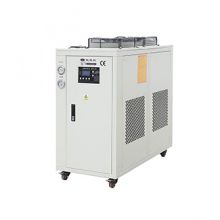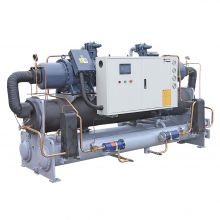We offer you 100% custom-made service Inquiry
In the pharmaceutical industry, temperature control is not just a necessity—it is critical to maintaining the quality, safety, and efficacy of pharmaceutical products. From raw material processing and drug synthesis to storage and transportation, every stage of pharmaceutical production requires precise and reliable temperature management. Without proper cooling systems in place, these processes could become unstable, leading to inefficiencies, compromised product quality, and potential safety risks. In this context, chillers;have become indispensable, providing the critical cooling required for a variety of processes.
To understand the essential role of chillers in pharmaceutical manufacturing, it's important to first understand what they are and how they work. A chiller is a refrigeration system designed to remove heat from a liquid—typically water or a specialized coolant—which is then circulated through equipment or processes that require cooling.
In the pharmaceutical sector, chillers help maintain the stable temperatures necessary for both chemical and biological stability. Whether it's cooling reactors during drug synthesis, maintaining conditions in fermentation tanks, or stabilizing storage environments for sensitive products, chillers regulate temperature precisely and consistently, ensuring that the temperature does not fluctuate, which could otherwise affect product integrity.
Chillers are used across different applications in pharmaceutical manufacturing, with types of systems depending on the scale of the process. Some of the most commonly used types are:
Air-cooled chillers: These use ambient air to dissipate heat and are ideal for smaller operations or environments with limited access to water resources.

Water-cooled chillers: These offer higher efficiency and are typically used in larger-scale production settings with central cooling towers.

Low-temperature chillers: These are essential for applications requiring sub-zero temperatures, such as freeze-drying (lyophilization), cold storage of Active Pharmaceutical Ingredients (APIs), or vaccine preservation.

Modern pharmaceutical chillers come equipped with advanced temperature control systems that can maintain the temperature within precise ranges—often within ±0.5°C or better. This level of accuracy is essential when working with sensitive products such as biologics, vaccines, or chemical compounds where temperature fluctuations can lead to compromised efficacy, safety, or stability.
With a clear understanding of what chillers are and how they operate, let's dive into their specific roles across various pharmaceutical applications. Chillers are utilized throughout the entire pharmaceutical production chain, contributing to higher product quality, greater process efficiency, and better regulatory compliance.
Pharmaceutical production, particularly in the manufacture of Active Pharmaceutical Ingredients (APIs), often involves chemical reactions or fermentation processes that generate excess heat. Managing this heat is crucial to ensure that reactions proceed under optimal conditions. Without proper temperature regulation, these processes can become unstable, leading to substandard products, chemical breakdown, or even dangerous by-products.
For example, in the synthesis of APIs, maintaining an exact temperature ensures that the reaction runs efficiently and safely, producing the intended product in the desired yield and purity. Similarly, during fermentation (used for producing antibiotics, vaccines, or enzymes), microorganisms need to operate at specific temperatures to maximize production and yield. Chillers continuously maintain these temperatures, ensuring that the conditions are ideal for the entire production process.
Moreover, crystallization is another critical process that chillers support. Crystals formed in pharmaceuticals must be of consistent size and shape to ensure proper solubility and bioavailability. A chiller helps control the cooling rate, directly affecting crystal formation and size.
Pharmaceutical manufacturing relies on a variety of specialized equipment, such as reaction vessels, evaporators, drying machines, and vacuum pumps. These machines generate significant heat during operation, and excessive heat can lead to equipment malfunctions, reduced efficiency, or premature failure. Properly cooling these components is essential to maintain smooth operation and avoid costly breakdowns.
Chillers remove the excess heat generated by these machines, ensuring that they operate within their optimal temperature ranges. For example, lyophilizers (freeze-dryers) require precise temperature control to prevent product degradation during the drying process. Similarly, centrifuges and evaporators benefit from consistent cooling, ensuring that the entire process remains efficient and safe.
By keeping sensitive equipment at a stable, controlled temperature, chillers also extend the life of pharmaceutical machinery, reducing maintenance costs and preventing unexpected shutdowns. This is especially important in a pharmaceutical manufacturing environment where even short periods of downtime can disrupt production schedules and lead to significant financial losses.
he storage and transportation of pharmaceuticals is one of the most critical stages in maintaining drug quality. Many pharmaceutical products—especially biologics, vaccines, and biotech drugs—are highly sensitive to temperature fluctuations. Even small deviations from the required temperature range can compromise the potency, safety, and effectiveness of the product.
Chillers are essential in maintaining the cold chain throughout the storage and transportation process. This cold chain involves keeping products at a precise temperature from the moment they are manufactured until they are delivered to pharmacies, hospitals, or healthcare providers. Chillers are used in:
1.Refrigerated warehouses and cold storage units that store sensitive pharmaceutical products.
2.Refrigerated trucks and shipping containers to ensure that products maintain the required temperature during transportation.
3.Backup cooling systems to prevent temperature deviations in case of power outages, which could otherwise compromise large quantities of drugs.
Maintaining an uninterrupted cold chain is essential not only for product safety but also for compliance with stringent regulatory requirements, such as those enforced by the FDA and EMA.
In pharmaceutical research and development, precise temperature control is critical for ensuring the integrity of experiments and producing reliable results. Many pharmaceutical laboratories use equipment that requires consistent cooling, including centrifuges, incubators, freezers, and cryostats.
For instance, chromatography and high-performance liquid chromatography (HPLC) are temperature-sensitive processes that must be controlled accurately to ensure reliable separation of chemical compounds. Similarly, during the development of vaccines or biologics, maintaining the right temperature in laboratory incubators or cold storage is essential to preserving the integrity of cell cultures or proteins.
Chillers play a vital role in ensuring that these sensitive laboratory processes are carried out under controlled thermal conditions, helping researchers obtain reproducible, accurate results while safeguarding valuable research materials.

As we've seen, chillers are integral to ensuring that pharmaceutical production processes are carried out smoothly, safely, and efficiently. Let's explore some of the broader benefits that chillers bring to the pharmaceutical industry:
Improved Process Stability: Continuous, precise cooling ensures that pharmaceutical processes remain consistent, minimizing the risk of errors or inconsistencies in production.
Energy Efficiency: Modern chillers are designed to operate efficiently, helping reduce overall energy consumption and lower operational costs while maintaining high-performance cooling.
Extended Equipment Lifespan: By preventing overheating, chillers help protect critical pharmaceutical equipment, ensuring longer operational lifespans and fewer repairs.
Regulatory Compliance: With strict industry regulations regarding temperature control, chillers help pharmaceutical companies comply with requirements set by regulatory agencies like the FDA, EMA, and WHO, ensuring product safety and quality.
Chillers are essential in ensuring that pharmaceutical processes run smoothly, maintaining product quality and safety through precise temperature control. From production to storage and transportation, chillers help maintain the stability of temperature-sensitive pharmaceuticals.
As the pharmaceutical industry demands more efficient and reliable systems, choosing the right chiller solution is crucial. At Kaydeli, we specialize in providing energy-efficient chiller systems tailored to the pharmaceutical industry's needs, helping you maintain operational efficiency and compliance with industry standards.
By continuing to use the site you agree to our privacy policy Terms and Conditions.